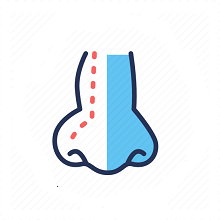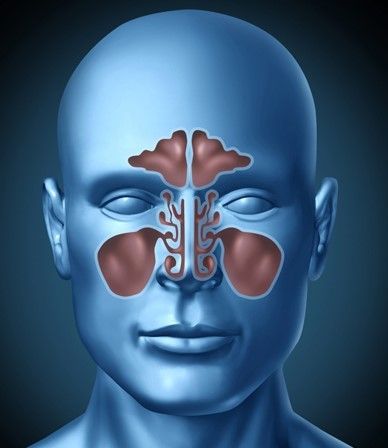Nose Surgery is a surgical procedure that helps to reshape the damaged nose and also reduces sinus problems. It involves modifying the cartilage and bone of the nose. It is also known as a nose job.
Types of Nose surgery are:
Open nose surgery
Closed nose surgery
- Fixes the broken nose bone
- Boosts the self-confidence in people who suffer from self-esteem due to irregular nose shape
- Decreases the snoring
- Improves breathing
- Reduce sinus problems
- Provides the desired shape of the nose
- Restores facial symmetry
- To narrow the nostrils
- Too wide or elevated or drooping nasal tip
- To straighten the nose bridge
- Broken nose
- To change the size of the nose
- Irregularities in nose
- To change the angle of the nose
- Nasal hump
- To reshape the tip of the nose
FUNCTIONAL ENDOSCOPIC SINUS SURGERY
The most important element in development of sinusitis is the osteomeatal complex consisting of the outflow tracts of all of the sinuses into the nose. The cilia move mucus toward the naturally occurring ostium. If the cilia are interfered with, stagnation of mucus will occur.
Read MoreINFERIOR TURBINOPLASTY
Less invasive “cold” techniques: powered submucosal inferior turbinoplasty In a powered/submucous inferior turbinoplasty, your surgeon uses an instrument called a microdebrider with a tiny rotating cutting tip that can be changed for individual anatomy and type of surgery.
Read More
SEPTOPLASTY
The nasal septum is the wall dividing the nasal cavity into halves; it is composed of a central supporting skeleton covered on each side by mucous membrane. The ideal nasal septum is exactly midline, separating the left and right sides of the nose into passageways of equal size.
Read More
RHINOPLASTY
Rhinoplasty is a plastic surgery that is used to improve the function (reconstructive surgery) or appearance (cosmetic surgery) of your nose. Rhinoplasty can be used for cosmetic reasons, correction of birth defects, or breathing problems. It reshapes or repairs.
Read More
SEPTORHINOPLASTY
Each year thousands of people undergo surgery of the nose. Nasal surgery may be performed for cosmetic purposes, or a combination procedure to improve both form and function. It also may alleviate or cure nasal breathing problems, correct deformities from birth or injury, or support an ageing, drooping nose.
Read MoreFRACTURE NASAL BONE REDUCTION
It is the surgical procedure performed to treat the fractures of the nasal bones from injuries. The objective of the fractured nasal bone reduction is to restore the position of cartilage and the bones of the nose for the deformities caused by an injury.
Read MoreSTAPEDOTOMY
Stapedotomy is a surgical procedure that involves fixation of the stapes, one of the three tiny bones in the middle ear. This procedure involves creating a small hole within the central footplate of the stapes and inserting a piston-like prosthesis to restore mobility. It is used to treat conductive hearing loss due to otosclerosis and improves hearing quality.
Read MoreSURGERY FOR OSA
Uvulopalatopharyngoplasty (UPPP) is the common surgery carried to treat OSA. It involves the removal of excess tissue from the soft palate and pharynx to clear the airflow obstruction that causes breathing difficulties during sleep. Besides UPPP, Laser-assisted Uvuloplasty (LAUP) is the surgical procedure recommended for sleep apnea.
Read MoreENDONASAL DCR
Uvulopalatopharyngoplasty (UPPP) is the common surgery carried to treat OSA. It involves the removal of excess tissue from the soft palate and pharynx to clear the airflow obstruction that causes breathing difficulties during sleep. Besides UPPP, Laser-assisted Uvuloplasty (LAUP) is the surgical procedure recommended for sleep apnea.
Read MoreBALLOON SINUPLASTY
Balloon sinuplasty is an endoscopic nasal surgery that uses small balloon catheters to drain blocked sinuses. It is used to treat severe rhinosinusitis, sinus inflammation, and nasal blockages. This procedure is minimally invasive which excludes cuts and loss of nasal tissues or bones and is very effective in relieving the symptoms of rhinosinusitis.
Read More

